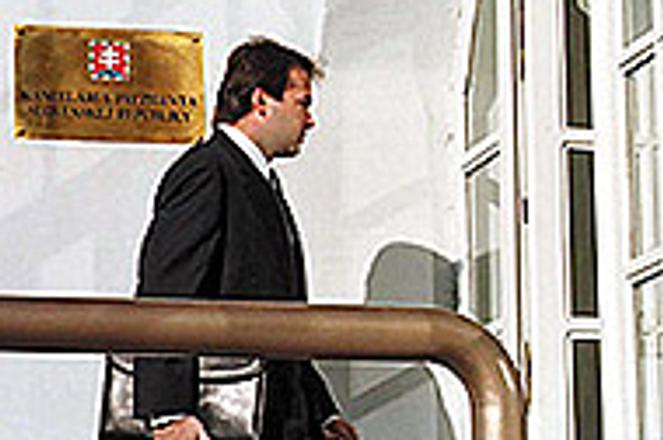Former VSŽ head Alexander Rezeš has asked President Schuster to pardon him for gutting a historical building to construct an indoor swimming pool.photo: TASR
Recent applications for a presidential pardon from two notorious Mečiar-era privatisers have highlighted the slow pace of investigations into major crimes committed during the 1994 to 1998 rule of the three-time former prime minister and his Movement for a Democratic Slovakia (HZDS).
Alexander Rezeš, the former head of the eastern Slovak steel giant Východoslovenské železiarne (VSŽ), and Karol Martinka, who has been charged with fraud and mismanagement at Piešťany spas, appealed late last year to President Rudolf Schuster for amnesty from prosecution. Schuster has given no indication of how he will decide, saying only that he would not publicly "theorise about my future decisions" until obtaining advice from the Justice Ministry [which studied the Martinka request] and the Attorney General [Rezeš].
Even if clemency is not given, however, the requests have already fuelled public anger that the rich and powerful benefactors of Mečiar's rule seem to be beyond the reach of the law.
Indeed, one of the first and most fervent promises made by the current government of Mikuláš Dzurinda after it took office in October 1998 was to go after privatizers who had defrauded the state during sales of public property over the previous four years. But more than half way through the Dzurinda government's term in office, none of the major privatisation cases have been resolved, nor have any of the alleged criminals been jailed. Many Slovaks are beginning to doubt that the culprits will ever be arraigned.
Rap sheets
While investigations into both Rezeš and Martinka continue, they would be dropped were Schuster to grant a pardon. "The decision is up to the President," said Eva Reptišová, the prosecutor overseeing the Rezeš case. "But if he decides to pardon Rezeš, the prosecution will have to stop immediately."
Rezeš had originally requested a pardon on September 21, 1999 on the basis of poor health, but the pardon process was not begun until last November when he returned to Slovakia to take a medical exam. Martinka filed his request December 7 after his mentally disturbed wife attempted to murder the couple's nine year-old son Filip, then commit suicide in October.
Reptišová added that two previous pardons issued by Schuster had been given to applicants claiming "incurable illnesses". Schuster has also six times gone against the advice of law enforcement officials in his decisions.
Rezeš is suspected of deliberately damaging a historical baroque building in Banská Štiavnica. After getting a permit for what he claimed would be minor renovations, he gutted the cultural heritage building to make space for, among other features, an indoor swimming pool.
But the main charge against Rezeš is gross mismanagement at VSŽ and the stripping of the firm's assets to various sister companies. While driving VSŽ to the brink of collapse, he allegedly made lavish personal purchases such as a luxurious Spanish villa worth an estimated 100 million Slovak crowns ($2.1 million).
Martinka, who was charged with fraud and mismanagement at Piešťany spas, had his Vadium Group firm return a 68% stake in the spas it had acquired to the FNM state privatisation agency, in a move insiders said was effectively an admission of his guilt. The family tragedy occurred at his villa in Vienna where he has been living for nearly two years despite Slovak police attempts to have him extradited.
The Justice Ministry has publicly called on Schuster to not pardon Martinka. Ministry spokeswoman Andrea Krajniaková said Minister Ján Čarnogurský's stance is that "Mr. Martinka claims to be innocent, therefore he should not be pardoned. Granting an amnesty would deprive Mr. Martinka of the option of clearing himself of fraud charges before the court."
Losing patience
As President Schuster considers freeing Rezeš and Martinka of legal responsibility, Slovaks are losing patience with what they see as delayed justice. Citizens from the prime minister to students on the street have weighed in on recent days with disgust over a system they say is failing to bring criminals to book.
"These people should have been in jail long ago," said 26 year-old student Ján Sodek in Bratislava. "How arrogant of them to ask for pardons - what kind of a law allows them to ask for pardons in the first place? I don't know why it is taking so long to put them where they belong."
Prime Minister Dzurinda also admitted in an on-line chat with readers of the Sme daily on January 16 that the investigation of Mečiar-era privatisers was taking longer than he had expected.
"To be honest with you, I too think that it's all taking a lot of time," Dzurinda wrote, but went on to defend the investigators. "The cases are being solved. I understand that the links [of those involved in these cases] to the past are complicated and slowing down the whole process. But if we persevere, and we have to persevere, we'll see verdicts in the end."
Interior Minister Ladislav Pittner also voiced some restlessness, saying on a January 20 Slovak radio political discussion that he too would like to see the legal process quickened.
"However, unlike during communism, we are to a certain extent limited by the fact that we have to follow democratic principles," Pittner said. "They [communists] would have easily put anyone they wanted in jail simply by telling the prosecutors and judges how to decide. But our respect for democratic principles makes our work more time-consuming, even though the public would like to see these people in jail now."


